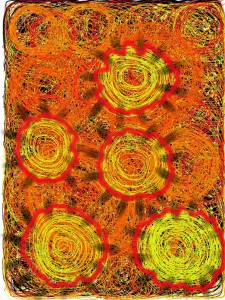 Eek, I thought I had been better about posting. At any rate, here I am still in California writing away. I had Wayne here Friday-Sunday, so no writing was done, but we really had just a delightful time with each other and both were very sorry to part when I dropped him off at the airport on Sunday.
Eek, I thought I had been better about posting. At any rate, here I am still in California writing away. I had Wayne here Friday-Sunday, so no writing was done, but we really had just a delightful time with each other and both were very sorry to part when I dropped him off at the airport on Sunday.
Today’s totals:
Today’s wordcount: 5884
Current Hearts of Tabat wordcount: 119083
Total word count for the week so far (day 1): 5884
Total word count for this retreat: 52435
Worked on Hearts of Tabat, “Blue Train Blues”
Time spent on SFWA email, discussion boards, other stuff: 30 minutes
Besides working on “Hearts,” I have been finishing up “Blue Train Blues”, a steampunk set in the Altered America world, although over on the other side of the world, in their version of France, occupied by vampires. It’s not a pieceI’ve promised anyone, so it will probably go up on Patreon either this month or the next.
Here’s a section from it:
The evening wore on. Fortunes were squandered and won, and then squandered again. The cigar smoke haze thickened to the point of oppression, and the air grew stuffy except when someone entered or exited the car, bringing in a night breeze that cut through the heat like a saber stroke.
I tried to keep any thoughts from betraying us, but I could not help but wonder. The vampire knew my lord was cheating, he was threatening to say it openly, and there was only one end to it if he did make that accusation: they would kill my lord then and there.
But my lord seemed oblivious to his impending fate. He sat there playing and chattering away, an endless stream of blather that was his damned-silly-English-peer act, playing to the crowd with a touch of whimsy now and then. But underneath it all, he and I and the vampires knew, he was a werewolf, and while they had the numbers, he could at least account for some.
Lost in these thoughts, I swam back as the Renfrew beside me stepped forward to provide and light a cigarette, then retreated into his former position. My lord was talking about cars.
“Rover claims their new model goes faster than le Train Bleu,” von Blodam said.
“That’s nothing special,” my lord asserted. “I could leave with the train from here and my car could get me to my club in London before the train hits Callais.”
Von Blodam raised an incredulous eyebrow. “A bold claim.”
“It’s good English technology,” my lord said, and the edge to his voice was the same as though he’d bared his teeth, by the way the tension jumped in the room. I felt two Renfrews sidle closer.
But von Blodam laughed. “Then perhaps we should bet on. You will race le Train Bleu, and if you win, I will give you the prize of your choice.”
“And if that prize was to answer a question truthfully?” My lord’s eyes burned but could not melt the room’s ice.
Von Blodam smiled, and I could feel disaster looming like an iceberg. “Very well. Three questions even, answered with absolute truth, on my honor. What would you put up against something like that, my Lord?”
“Name it,” said my Lord softly. “For it’s clear that you are angling at something.”
The toothy smile broadened. “Very well. A reward of my choice, if the train reaches Callais before you are at your club.”
“A reward of your choice,” my lord said and his voice was expressionless. But his eyes still burned.










4 Responses
Randy Rambo liked this on Facebook.
Danielle Myers Gembala liked this on Facebook.
Esther Hazleton liked this on Facebook.
Sandra Odell liked this on Facebook.